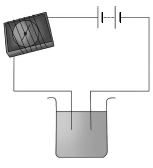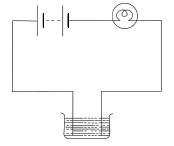Question 1:
Most liquids that conduct electricity are solutions of ____________ , ____________ and ____________.
Answer:
Acids, bases, salts
Question 2:
The passage of an electric current through a solution causes ____________ effects.
Answer:
Chemical
Question 3:
If you pass current through a copper sulphate solution, copper gets deposited on the plate connected to the ____________ terminal of the battery.
Answer:
Negative
Question 4:
The process of depositing a layer of any desired metal on another material by means of electricity is called ____________.
Answer:
Electroplating
Question 5:
When the free ends of a tester are dipped into a solution, the magnetic needle shows deflection. Can you explain the reason?
Answer:
The needle shows deflection because the solution is a good conductor of electricity and electric current has a magnetic effect.
Question 6:
Name three liquids, which when tested in the manner shown in the figure given below, may cause the magnetic needle to deflect.
Answer:
Tap water, lime water and vinegar causes the magnetic needle to deflect.
Question 7:
The bulb does not glow in the setup shown in the figure given below. List the possible reasons. Explain your answer.
Answer:
In the given set up, if the bulb does not glow, it may be because the bulb may be fused or the connection of the wires may be loose. Replace the bulb and check once again. If the bulb still does not glow, check the connection of wires. However, after tightening the connections and testing the bulb, if it still does not glow, then the only possible reason can be that the solution is a poor conductor of electricity.
Question 8:
A tester is used to check the conduction of electricity through two liquids, labelled A and B. It is found that the bulb of the tester glows brightly for liquid A, while it glows very dimly for liquid B. You would conclude that
- liquid A is a better conductor than liquid B
- liquid B is a better conductor than liquid A
- both liquids are equally conducting
- conducting properties of liquids cannot be compared in this manner
Answer:
liquid A is a better conductor than liquid B
Question 9:
Does pure water conduct electricity? If not, what can we do to make it conducting?
Answer:
No, pure water does not conduct electricity. However, adding some salt, acid or alkali can make pure water a good conductor of electricity.
Question 10:
In case of a fire, before the firemen use the water hoses, they shut off the main electrical supply for the area. Explain why they do this?
Answer:
Tap water is a good conductor of electricity. Hence, to avoid electric shock, firemen shut off the main electrical supply before using water hoses.
Question 11:
A child staying in a coastal region tests the drinking water and also the seawater with his tester. He finds that the compass needle deflects more in the case of seawater. Can you explain the reason?
Answer:
Drinking water is generally free of salts and minerals, whereas seawater is rich in salts and minerals. Thus, seawater is a better conductor of electricity than drinking water. Hence, compass needle deflects more in case of seawater as compared to drinking water.
Question 12:
Is it safe for the electrician to carry out electrical repairs outdoors during heavy downpour? Explain.
Answer:
No, it is not at all safe to perform outdoor electrical repairs when it is raining. Rather, it is dangerous because the electrician may get an electric shock as rain water is a good conductor of electricity.
Question 13:
Paheli had heard that rainwater is as good as distilled water. So she collected some rainwater in a clean glass tumbler and tested it using a tester. To her surprise she found that the compass needle showed deflection. What could be the reason?
Answer:
Though rainwater is as pure as distilled water yet it may be contaminated by the impurities suspended in the atmosphere. These impurities make rainwater a better conductor of electricity. This is the reason that the compass needle showed deflection.
Question 14:
Prepare a list of objects around you that are electroplated.
Answer:
Bicycle rims, door handles, taps, metallic pens, artificial jewellery, utensils, belts, and buckles.
Question 15:
The process that you saw in Activity 7 is used for the purification of copper. A thin plate of pure copper and a thick rod of impure copper are used as electrodes. Copper from impure rod is sought to be transferred to the thin copper plate. Which electrode should be attached to the positive terminal of battery and why?
Answer:
The impure copper rod should be attached to the positive terminal because copper ions will get drawn towards the negative terminal and will be deposited there. So, the copper from the impure rod will get deposited on the pure copper plate.


